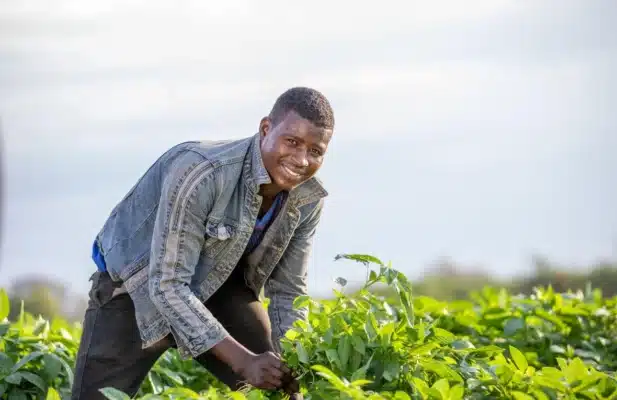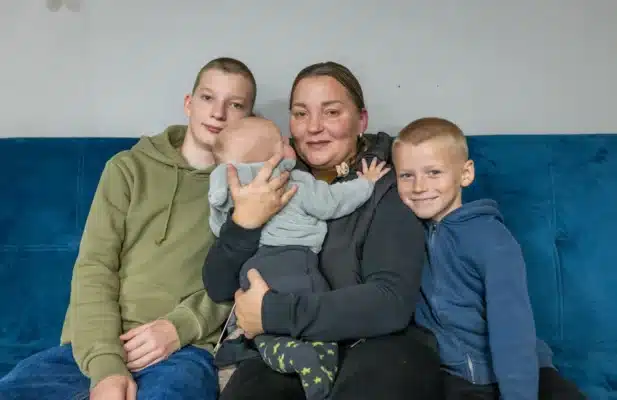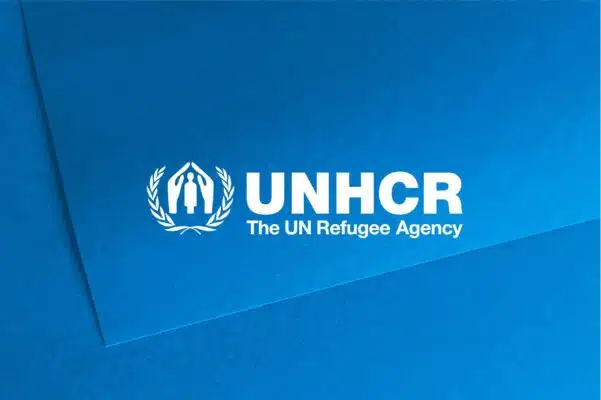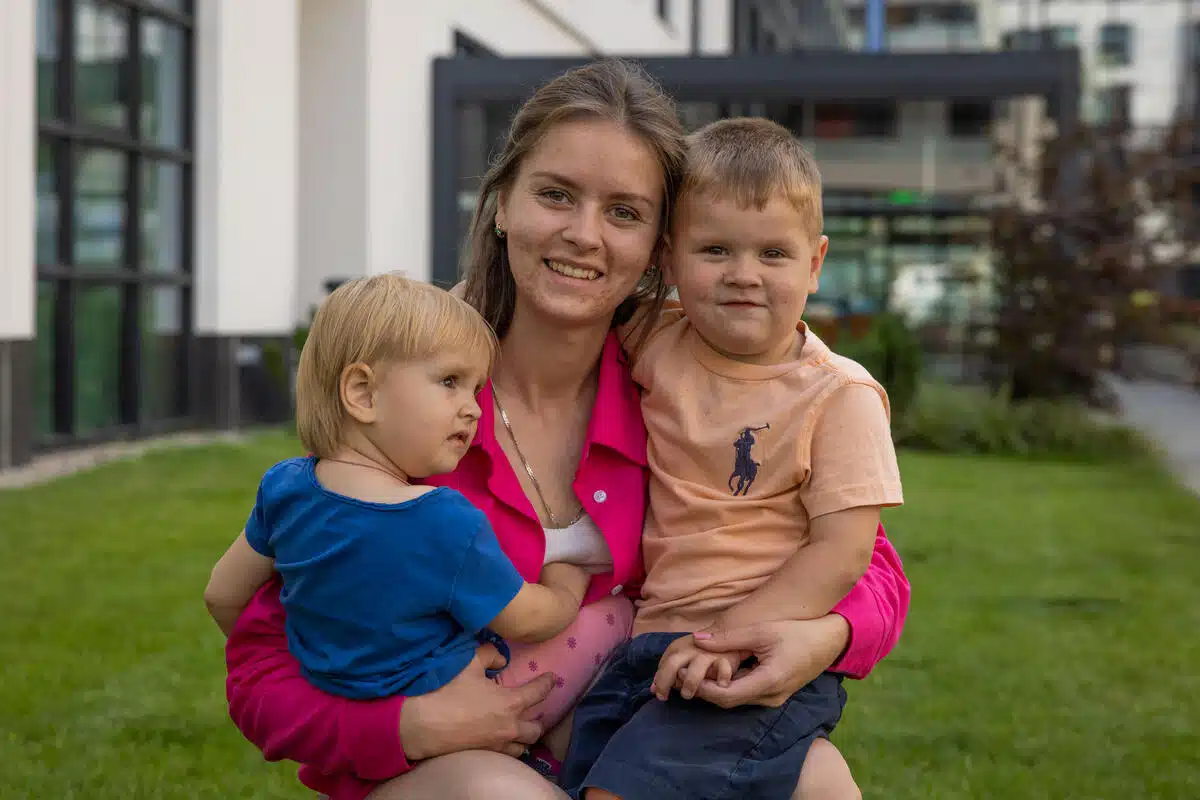
Ella, a refugee from Ukraine, with her children Zlata, 1, and Matvii, 3. She has made use of free legal consultations to find out what her rights are in Poland. © UNHCR/Anna Liminowicz
A network of pro-bono lawyers in Poland has been helping newly arrived refugees from Ukraine navigate their rights and access social services
By Roger Burks in Warsaw, Poland
As Ella stood on the streets of Warsaw, Poland – a six-month-old baby in her arms and a two-year-old toddler by her side – she was relieved to be far from the war in Ukraine but deeply shaken and uncertain about what the future held for her young family.
A primary school teacher by profession, Ella and her children, Zlata and Matvii, are from the village of Katyuzhanka, 60 kilometres north of Ukraine’s capital, Kyiv. Katyuzhanka was one of the first places to be occupied during the full-scale invasion.
“We saw all of these planes, tanks and when our village became occupied, we immediately went to the west of Ukraine,” she said. “I was nervous and [the children] could feel it. I needed to take them to a safe place for […] their mental health.”
When missile attacks eventually spread to the area where they were staying, Ella made the difficult decision to leave her country. Since February 2022, more than 6 million refugees have fled the ongoing conflict in Ukraine. Most of them have come through Poland, and close to one million refugees are currently registered for temporary protection in the country.
Legal aid surpasses 2019 pledge
Amidst the trauma of losing homes and leaving loved ones behind, refugees often face struggles in finding legal aid and understanding their rights and what assistance they are entitled to in a new country: everything from housing and work opportunities requirements to childcare services and other social benefits. That’s where PILnet – a global network of legal professionals and civil society organizations – has made a huge difference in Poland and other countries around the world.
PILnet coordinated an ambitious pledge at the 2019 Global Refugee Forum (GRF): mobilizing the global legal community to protect and find solutions for refugees and other forcibly displaced people. Initially, a PILnet-led group of 80 law firms, bar associations, legal aid NGOs, and other organizations pledged a generous 127,000 pro bono hours per year.
Over the last four years – as crises multiplied around the world and the number of forcibly displaced people reached historic highs – the global legal community has expanded its efforts. Lawyers in Poland mobilized as soon as refugees from Ukraine – like Ella and her children – began crossing the border.
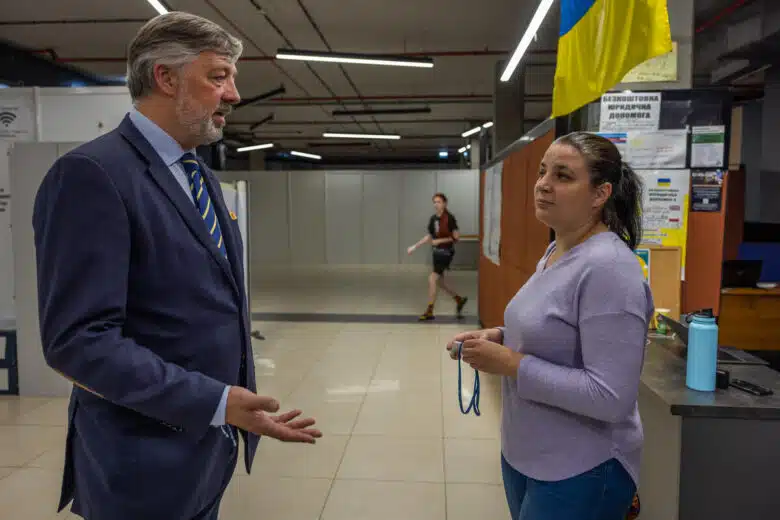
Volunteer lawyers Filip Czernicki (left) and Malgorzata Dziewanowska (right) discuss client cases at the Modlinska collective shelter in Warsaw where some 1,000 Ukrainian refugees currently live. © UNHCR/Anna Liminowicz
The results are inspiring. As of September 2023, lawyers have offered 585,858 pro bono hours, exceeding the original pledge. Furthermore, the network has grown to a total of 110 partner firms, associations and organizations.
Collaboration between the private sector, organizations, governments and refugees themselves is a focus of the second GRF in Geneva, Switzerland from 13-15 December. It will convene leaders from around the world to reflect on challenges, explore opportunities and pledge actions to help those forced to flee their homes, as well as the countries that host them.
Building on the achievements of the 2019 Pledge, PILnet is coordinating the 2023 GRF Legal Community Pledge, which is now open for signature.
Lawyers step up
That spirit of generosity and kindness is exemplified by Malgorzata, the Warsaw-based lawyer who has been helping Ella and her children. “I think that it’s something magical in being a lawyer, interpreting the provisions and actually helping people,” she said. “Just like all my life, I work in the sector where I’m helping people who have no money, no knowledge of how to get support.”
“I think that it’s something magical in being a lawyer, interpreting the provisions and actually helping people.”
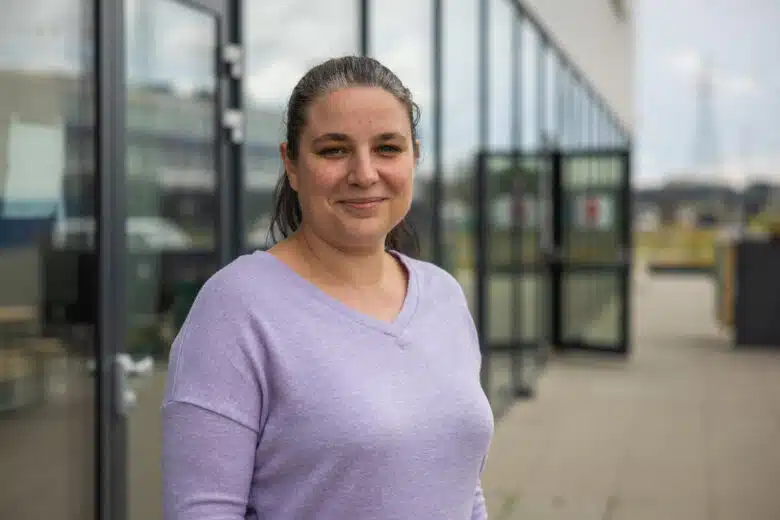
Malgorzata Dziewanowska has been providing free legal advice to refugees in Poland. © UNHCR/Anna Liminowicz
In addition to her work as a lawyer, Malgorzata is an assistant professor at the University of Warsaw and helps run a legal support project for youth at risk of homelessness. She is a mentor to young lawyers in Poland and helps connect them to opportunities for pro bono work. All of this made her the ideal advocate to help Ella and her two children.
“The case of Ella is one of the very common cases that we have here. It’s pretty complicated, especially if you don’t speak Polish,” Malgorzata explained. “The law is changing constantly and it’s not giving people long-term provisions on which they can base their future.”
Ella first encountered Malgorzata through a local organization that helps Ukrainian refugees in Warsaw. From that moment, they met regularly.
“[Malgorzata] helped me a lot with questions about the things I have a right to and what I’m entitled to. She helped me specifically with issues related to my children,” she said.
“I visited her every Monday, and she was always there for me. I felt safe, as if there was a strength behind me who will advise, who will help and even if there are difficult legal issues, will direct [me] where necessary.”
“It’s not only just codes and paragraphs and contracts, but the most important thing is the relationship that we are having with our clients,” Malgorzata added. “Every time I meet a person, I try to listen to this person. I try to do my best to help this person. If they are coming back, we know that we are doing something good for them. They trust us.”
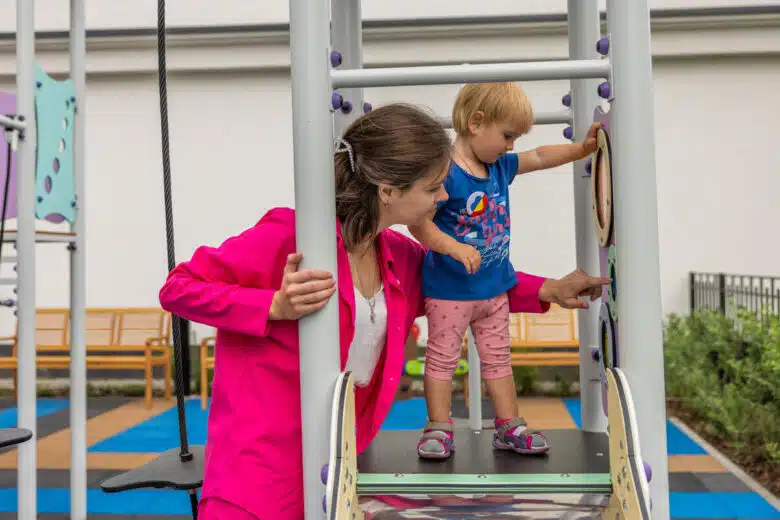
Ella plays with her one-year-old daughter, Zlata. © UNHCR/Anna Liminowicz
Although Ella misses her home in Ukraine and wishes for peace so she can return, she feels more secure now about her young family’s situation in Poland.
Malgorzata sees the unprecedented demand for their services as an opportunity for lawyers – in Poland and around the world – to give back to their communities and engage with people in life-changing ways.
“This is not only when the war is in Ukraine, but this is something that can be forever. I feel that every time we do something good, it changes the world even a bit,” she explained. “This is something that you don’t have to be paid for. You can just do it and you can feel good with yourself. Whatever you can do — just do it.”
Originally published by UNHCR on 17 November 2023.



